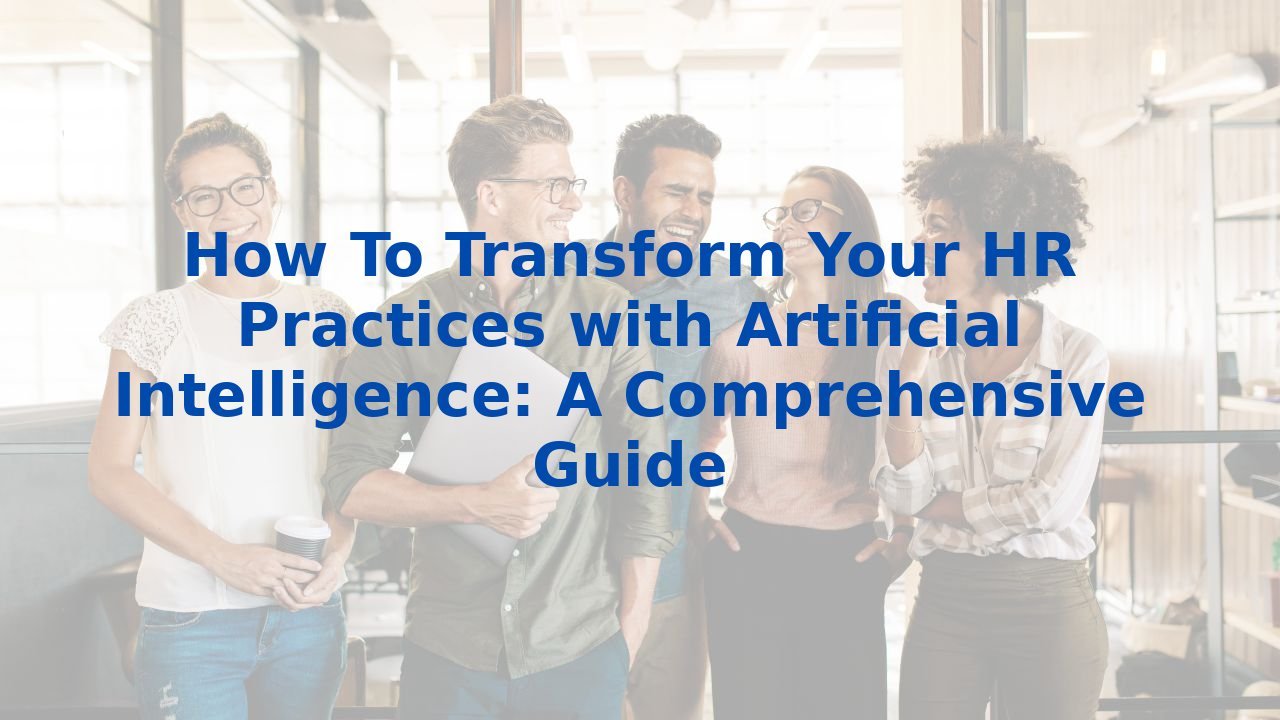How To Transform Your HR Practices with Artificial Intelligence: A Comprehensive Guide
The Future of Human Resources: Enhancing Business Processes through AI
Starting a career in Human Resources (HR) isn't just exciting; it opens the door to a world of opportunity within organizations. As we step into this dynamic field, we're presented with fresh challenges that allow us to shape positive workplace experiences, foster a culture of growth, and drive inclusion. However, what if we told you that the journey could be significantly enhanced through the integration of artificial intelligence (AI)? Let's dive into some key areas of HR that can benefit from the transformative power of AI.
Learning and Development: Revolutionizing Employee Training
The learning and development aspect of HR is crucial for any organization aiming for long-term success. By leveraging AI, companies can create personalized learning experiences that adapt to individual employee needs. AI-driven platforms can analyze performance data to identify skill gaps, recommend relevant training materials, and track progress efficiently.
This tailored approach not only accelerates skill acquisition but also boosts engagement among employees. When learners see that their training is personalized and relevant, they're more likely to be motivated and invested in their growth and development. Consequently, this leads to a more competent workforce, ultimately enhancing overall productivity.
Employee Engagement: Building Connections through AI
Employee engagement is at the heart of a thriving workplace. Organizations are increasingly recognizing the importance of fostering environments where employees feel valued and connected. AI tools can play a pivotal role in measuring and improving employee engagement.
From sentiment analysis to advanced surveys, AI can provide valuable insights into employee satisfaction levels, facilitating timely interventions when issues arise. With predictive analytics, HR can anticipate disengagement and enact solutions before it's too late. Furthermore, AI-driven chatbots can enhance communication, providing instant responses to employee inquiries, thereby fostering a sense of support and connection.
Talent Acquisition: Streamlining Recruitment with AI
Recruiting the right talent is a cornerstone of effective HR. With the integration of AI, the candidate sourcing process can become remarkably efficient. AI algorithms can sift through vast databases of candidates to identify individuals who best match job requirements, allowing HR professionals to focus on strategic decision-making rather than administrative tasks.
This process not only saves time but also increases the likelihood of finding diverse candidates who can bring unique perspectives and innovations to the team. As organizations continue to embrace diversity and inclusion, the role of AI in creating equitable hiring practices cannot be overstated.
HR Operations: Enhancing Efficiency in Processes
The operational side of HR can sometimes feel cumbersome, involving meticulous attention to numerous policies and processes. AI can automate these operations, significantly improving efficiency and reducing the potential for human error. For instance, AI can assist in managing payroll, benefits administration, and compliance tracking, freeing HR professionals to focus on strategic initiatives.
Moreover, with AI-driven analytics, organizations can gain deeper insights into workforce trends and performance metrics, enabling data-informed decisions that strengthen overall HR strategy. As a result, smooth organizational operations can be achieved, cultivating an environment for greater performance and employee satisfaction.
The Importance of Training Employees for AI Integration
As organizations integrate AI into their HR functions, it becomes essential to equip employees with the necessary skills to utilize these technologies effectively. Training is crucial not just for successful implementation but also for fostering a culture of innovation and adaptability within the workforce.
Training employees on AI tools empowers them to leverage this technology to enhance their productivity and decision-making capabilities. Continuous learning ensures that employees are well-versed in utilizing AI solutions in their daily tasks, further driving efficiency and a positive workplace culture.
Conclusion: A Bright Future Ahead
As we embark on our journey in Human Resources, the role of AI becomes increasingly significant in enhancing various processes—from learning and development to recruitment and operations. By adopting AI technologies, organizations can not only streamline their HR practices but also nurture a more engaged and effective workforce.
Let’s embrace these new beginnings together, supporting one another as we navigate the exciting landscape of HR and AI. What strategies have you found effective in integrating technology into your HR practices? Share your insights, and let’s grow together!



